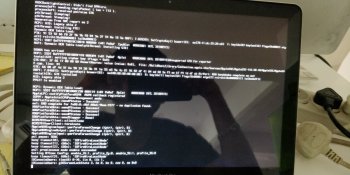Config : Macbook pro 13" mid 2012, Mac OS High Sierra, 256SSD, 4GB Ram
It restarts randomly, after it freezes. Sometimes it also gets stuck in the boot screen. The verbose result is shown in the image. Found a temporary fix. Whenever it gets stuck, if I do a first aid from recovery mode, it starts working again, but short lived.
I also have a kernel panic report from EtreCheck. Can someone help me fix this. Note : I have only upgraded my hdd to ssd.
It restarts randomly, after it freezes. Sometimes it also gets stuck in the boot screen. The verbose result is shown in the image. Found a temporary fix. Whenever it gets stuck, if I do a first aid from recovery mode, it starts working again, but short lived.
I also have a kernel panic report from EtreCheck. Can someone help me fix this. Note : I have only upgraded my hdd to ssd.
Attachments
Last edited:


